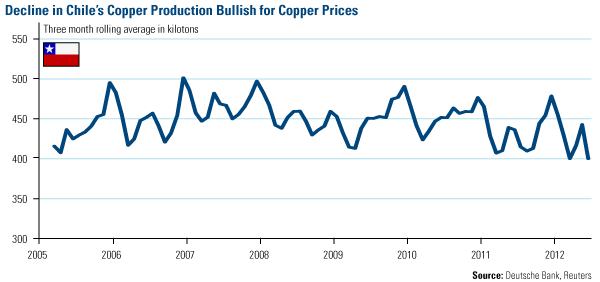Energy and Natural Resources Market Radar (August 6, 2012)

Strengths
- Crude oil prices gained again this week to reach nearly $109 per barrel (Brent) on supply concerns in the North Sea and rising geopolitical premiums as the conflict in Syria intensifies.
- Copper slipped 7 cents this week to $3.35 per pound but it has been one of the better-performing commodities in 2012, despite global growth slowing. The price has been supported by a combination of global inventory draw down, now back to 2009 levels and global producers struggling to meet near-term expectations. Analysts at Nomura note that in the short term, prices appear fundamentally supported and are likely to be range bound. On average, current producers are generating cash margins of about 50 percent, yet cost inflation sees new projects have a hurdle rate closer to $3 per pound.
Weaknesses
- U.S. natural gas prices fell back under $3 per mmbtu after the Department of Energy reported that weekly inventories of natural gas built larger than expected.
- Rio Tinto PLC is cutting some jobs at its regional headquarters in Melbourne and will close an office in Sydney as the Anglo-Australian mining giant moves to contain costs amid falling prices for key commodities such as iron ore, two people familiar with the matter said Tuesday.
- The latest round of PMI data released on Wednesday paints a weak picture for global growth, and suggests that Asian economies are starting to feel stronger headwinds from the eurozone crisis. China and India also recorded slower manufacturing growth for July, while Japan’s PMI fell to the weakest level since last year’s tsunami.
Opportunities
- Reuters reported that the Ecuador government is preparing mining reforms to attract investments, according to a top mining official. The proposed new bill would delay a windfall tax until miners recover their investments and set a ceiling on mining royalties, bringing more certainty.
- The Indonesian Coal Mining Association (ICMA) estimates the country’s coal production is now likely to be flat in 2012, compared with a 10-12 percent increase previously. Coal analysts with Macquarie Capital think this highlights that the falling thermal coal price has put pressure on producers, particularly at the smaller, low-energy end of the spectrum which should ultimately tighten seaborne coal supply and provide price support for falling coal prices.
- The Wall Street Journal reported that China has quietly increased its budget for railway investment this year by 16 percent, data from the Ministry of Railways showed. In its latest bond prospectus published on Chinabond, an official website for debt issues, the railway ministry said Monday it plans to spend 470 billion yuan ($73 billion) on infrastructure investment this year, up from the 406 billion yuan stated in a prospectus earlier this month. Spending on railway infrastructure in the second quarter slipped to 7.6 percent year-on-year, down from 8.1 percent in the first quarter, for its slowest pace in more than three years. Data from the railway ministry showed that it spent 148.7 billion yuan on infrastructure investment in the first half of 2012, down 39 percent from a year earlier.
Threats
- Reuters reported that Indian coal markets are seeing scattered defaults among end users and trade buyers in part because of a 20 percent slide in coal prices this year, though a vast majority are still honoring contracts.
- The Argentine government is moving to exercise further control over the country's oil sector with a new initiative that will require companies to submit annual investment plans for approval. Dow Jones Newswires reported that the government is making it mandatory for oil companies to submit their yearly investment plans to Deputy Minister of Economy Axel Kicillof by September 30 of each year, according to new rules published July 27 in the Official Bulletin. The new rules are likely to further exacerbate the tension between the Argentine government and the private companies operating in the country's hydrocarbon sector.










